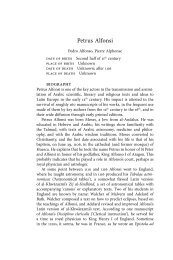reimagining-abstracts - University of Birmingham
reimagining-abstracts - University of Birmingham
reimagining-abstracts - University of Birmingham
You also want an ePaper? Increase the reach of your titles
YUMPU automatically turns print PDFs into web optimized ePapers that Google loves.
In twentieth-century Greek song production antiquity has been negotiated in a number<br />
<strong>of</strong> selective albeit, in some cases, parallel ways. For example, in state-sponsored<br />
compositions intended for particular contexts the ancient ancestors are collectively<br />
invoked as models to be emulated (military songs) or eternal glories to be prided on<br />
(Eurovision song contests). Characters from mythology, on the other hand, usually<br />
appear when their story provides an edifying parallel to be exploited either in a lighthearted<br />
(Photeinakis’ Nine girls) or a more sophisticated manner (Gatsos’<br />
Persephone’s nightmare). Finally, the reader comes across the use <strong>of</strong> ancient<br />
philosophers as wise men (Eustathiou’s Diogenes the wise) or familiar figures <strong>of</strong> the<br />
Attic landscape (Lades’ Sacred Way).<br />
The most emblematic philosophical figure <strong>of</strong> all provides the subject for the<br />
present paper. Sokrates features in a few songs normally in the presence <strong>of</strong> other<br />
ancients. Two compositions, however, merit special attention for they focus almost<br />
exclusively on him, at the same time representing the two main strands in Socratic<br />
reception: (a) Mister Teacher (1972) is a surrealistic dialogue between a<br />
schoolteacher and his students who want to learn about the teachings <strong>of</strong> Plato and<br />
Sokrates (!): this ingenious piece <strong>of</strong> mock-wisdom literature exploits fully the motif <strong>of</strong><br />
Sokrates the wise teacher; (b) Sokrates, Greece’s Eurovision song for the 1979<br />
contest, is a narrative “hymn” praising Sokrates as a martyr <strong>of</strong> philosophy, victim <strong>of</strong><br />
social prejudice, and forerunner <strong>of</strong> Christ: the song pays homage to a powerful<br />
Socratic image born in the first Christian centuries and current throughout the<br />
Byzantine times up until the Enlightenment.<br />
The paper ends with a brief comment on Sokrates’ unexpected appearance in a<br />
hip-hop 2004 song.<br />
Ana Chikovani<br />
The Image <strong>of</strong> Medea in Modern Greek Poetry<br />
The paper aims to investigate the literary image <strong>of</strong> Medea, a heroine <strong>of</strong> some Modern<br />
Greek poems. Medea’s image, interpreted in many different ways, has been popular<br />
among writers for thousands <strong>of</strong> years. Medea, who contained within herself mutually<br />
contradictory traits, was an ideal vehicle through whom authors and artists could<br />
explore what modern scholarship has called the problem <strong>of</strong> “self” and “other”. 1<br />
Greek poets - Kostis Palamas, Petros Vlastos, Giorgos Seferis, Andreas<br />
Embirikos, Nikos Engonopoulos and later - Petros Pieris, Konstantinos Bouras and<br />
others in one way or other refer to the theme <strong>of</strong> Medea. The poets revived the myth<br />
about Medea and the comparative approaches <strong>of</strong> the poems that refer to Medea bring<br />
out all that is tragic and ambivalent in her nature. Medea attracts the attention <strong>of</strong> poets<br />
mainly as a symbol <strong>of</strong> the terrible murder, but poets also are interested in the image <strong>of</strong><br />
Medea as <strong>of</strong> a traitor daughter, as loving wife, as abandoned women left alone in a<br />
foreign country, or as a representative <strong>of</strong> Barbarian world. In the late 1990-ies,<br />
Modern Greek playwrights started to take vigorous interest in the Medea’s character.<br />
There are various motivations. Some authors are more concerned with discharging<br />
Medea from moral responsibility; others turn her image into a certain symbol <strong>of</strong><br />
accomplishment <strong>of</strong> the so-called feminist ideas.<br />
Bearing in mind many various interpretations, the 20 th century Greek poets<br />
mainly are inspired by Euripidean version <strong>of</strong> Medea’s image, but toward the end <strong>of</strong><br />
the 20 th century and the beginning <strong>of</strong> the 21 st century in the Greek poetry the new<br />
interpretations <strong>of</strong> Medea’s image occur and disorganization <strong>of</strong> the Hellenocentric<br />
1 Sarah Iles Johnston, “Introduction”, in James J. Clauss & Sarah Iles Johnston (eds): Medea, Essays on<br />
Medea in Myth, Literature, Philosophy and Art, Princeton <strong>University</strong> Press, New Jersey 1997, p. 7.<br />
4







![Benyamin Asadipour-Farsani [EngD Conference abstract]](https://img.yumpu.com/51622940/1/184x260/benyamin-asadipour-farsani-engd-conference-abstract.jpg?quality=85)









